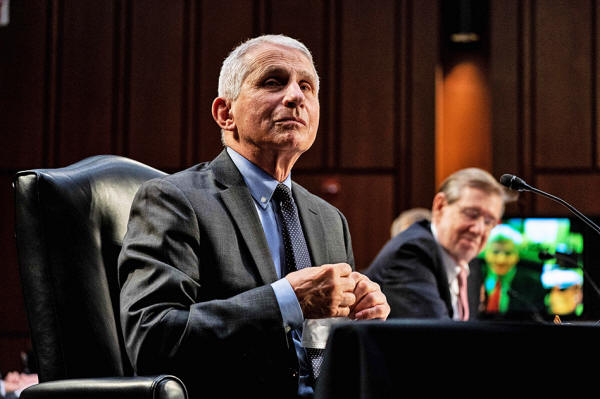|
Director at the National Institute Of Allergy and Infectious Diseases during a hearing, with the Senate Committee on Health, Education, Labor, and Pensions, on the COVID-19 response, on Capitol Hill in Washington, on March 18, 2021. (Anna Moneymaker-Pool/Getty Images)
Speaking with the Financial Times, Fauci said (read it here, with no Financial Times restrictions) since there is no way to fully eliminate COVID-19, caused by the CCP (Chinese Communist Party) virus,
Fauci's reference to prior infection, known as "natural immunity," is notable because, for months, Fauci and other top federal health officials have solely pushed COVID-19 vaccines as the way to defeat the 'pandemic'.
Last year, during interviews with the press, Fauci would often downplay natural immunity in favor of vaccines.
In the interview Tuesday, Fauci also suggested that booster shots may not be needed for all Americans.
Meanwhile, in the near future, the government response to the 'pandemic' will be primarily handled at the local level with little federal involvement.
He didn't say specifically when COVID-19 restrictions such as mask or vaccine mandates would end but could be done away with "soon," according to the Financial Times (read it here, with no Financial Times restrictions):
His remarks come as several Democrat-led states such as California, New Jersey, Delaware, and New York have moved to rescind mask mandates statewide, although some municipalities have opted to keep them.
Some federal officials, including Centers for Disease Control and Prevention (CDC) Director Rochelle Walensky, also still favor masking in certain settings.
A recent spike in COVID-19 cases fueled by the Omicron variant has dropped across most of the United States in recent days.
Hospitalizations from the CCP virus have also fallen significantly over the past two weeks or so, according to federal data.
The moves to simultaneously ease rhetoric on COVID-19 and end certain restrictions come just months before the 2022 midterm elections as Democrats have thin majorities in both houses of Congress.
A Jan. 31 Monmouth poll found that at least 70 percent of Americans agree that,
|


